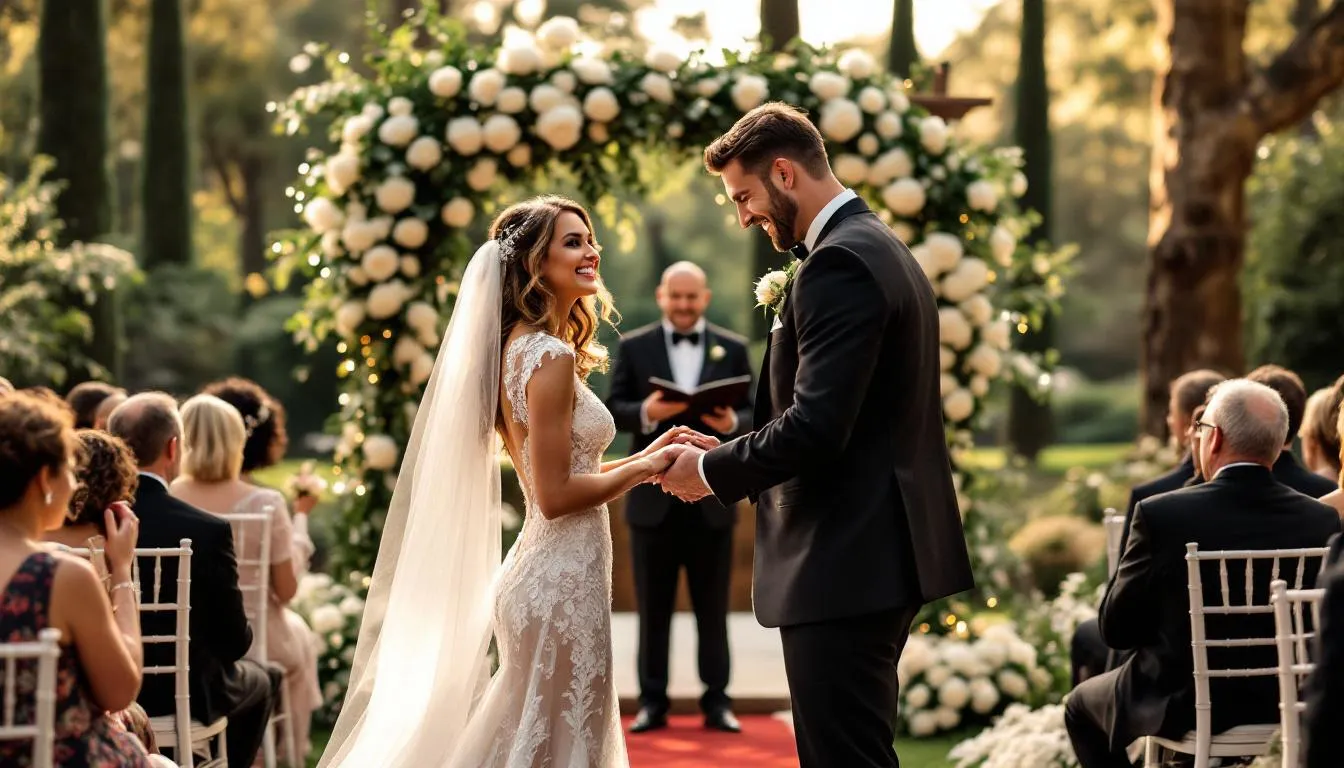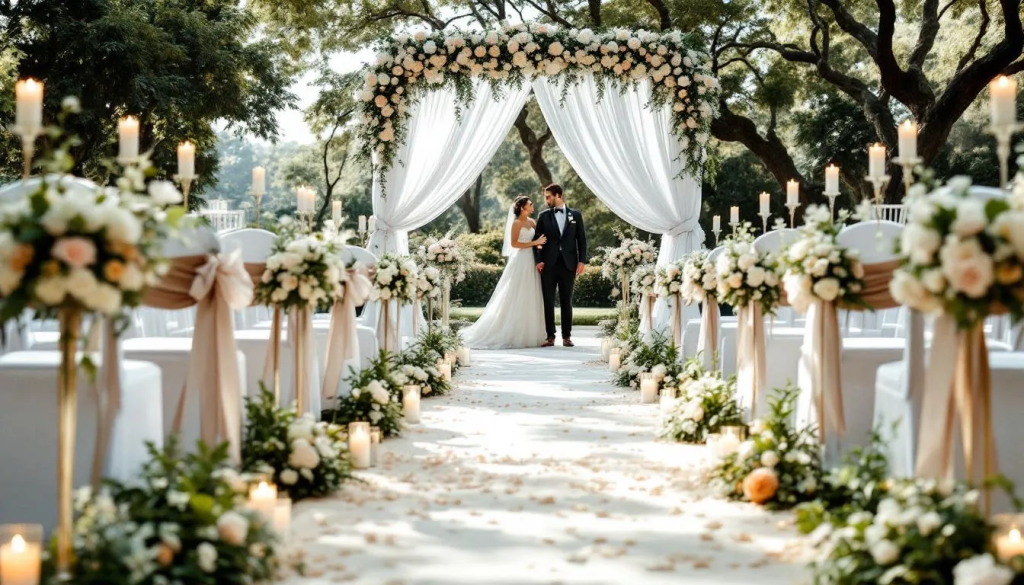Planning a wedding can be stressful, but a wedding planner ensures every detail is seamless, from venue to vows: how a wedding planner coordinates every detail for stress-free celebrations. In this guide, learn how planners manage venues, vendors, timelines, and any unexpected issues so you can enjoy a stress-free celebration.
Key Takeaways
- Wedding planners play a crucial role in finding and securing the perfect venue, balancing personal style with budget and capacity.
- Creating a comprehensive wedding vision through discussions, vision boards, and personalized planning sessions helps couples articulate their desires.
- Effective budget management and vendor coordination, along with detailed timelines, help ensure a smooth, stress-free wedding day experience.
Finding the Perfect Venue
The first step in planning a wedding is arguably the most crucial: finding the perfect venue for weddings. This choice sets the tone for the entire celebration and can make all the difference in influencing every other decision.
Wedding planners offer invaluable services in this area, providing insights into a diverse range of venues and breathtaking landscapes that align with your vision. For couples seeking beautiful outdoor options, considering local expertise, such as Preston Landscaping, can elevate the natural backdrop of a venue. They help navigate the delicate balance between personal style, budget, and venue capacity, ensuring that your wedding plans not only fit your dream but also accommodate your guests comfortably.
This initial step is foundational to a successful wedding planning process.
Venue Research and Selection
Wedding planners assist couples by creating a curated list of potential venues that align with their vision and budget. They organize site visits, allowing couples to assess the venues firsthand and visualize their wedding day.
Utilizing a vision board, planners help unify the couple’s ideas, ensuring that every aspect of the venue reflects their dream wedding. This thorough research and selection process is crucial for setting the stage for a memorable celebration.
Crafting Your Wedding Vision
Creating a wedding vision is an exciting part of the planning journey. Wedding planners facilitate discussions that help couples articulate their dreams and desires for the wedding. They provide creative ideas and industry knowledge to assist in making informed decisions.
Planners weave in personal style and preferences to make the wedding a true reflection of the couple’s individuality and love story. This bespoke approach transforms the planning process into a collaborative and enjoyable experience.
Creating a Vision Board
A vision board serves as a visual representation of the couple’s wedding dreams, aligning their planning efforts. The process of creating this board allows couples to clarify their ideas and communicate their preferences and style.
Key elements include:
- Themes
- Colors
- Styles
- Inspirational images that resonate with the couple’s vision
Incorporating inspirational details, such as artificial flower arrangements, can also help visualize decor elements that will bring consistency and elegance to the final wedding setting. T
Personalized Planning Sessions

Personalized planning sessions involve in-depth conversations about the couple’s love story, shaping their wedding vision. Wedding planners provide tailored support, ensuring every detail reflects the couple’s unique style and preferences. Couples may also factor in thoughtful extras such as bridal shower gifts, which become part of the overall celebration experience.
These sessions offer feedback, advice, and emotional support, fostering a collaborative environment where the couple and planner work together to articulate a cohesive wedding vision.
Budget Management
Effective budget management is crucial in wedding planning to ensure funds are allocated efficiently and unexpected expenses are avoided. Wedding planners create detailed budgets that include all anticipated expenses, helping couples stay within their financial limits.
This comprehensive planning support approach ensures that couples can enjoy their special day without financial stress.
Setting a Realistic Budget
Setting a realistic budget involves:
- Researching average costs for various wedding elements.
- Working with experienced planners who guide couples through the process.
- Allocating funds efficiently.
- Setting deadlines to stay focused.
This structured approach ensures that the budget aligns with the couple’s vision while avoiding financial strain.
Tracking Expenses
Tracking expenses is essential to avoid starting married life in debt. Wedding planners use several strategies to manage expenses:
- Use software tools to monitor expenses and provide regular updates to clients.
- Negotiate with vendors to save couples money.
- Include a buffer for unexpected expenses to avoid costly mistakes.
This meticulous tracking ensures a smooth financial planning process.
Selecting Vendors and Services
Choosing the right vendors is critical to the overall wedding experience. Wedding planners manage vendor coordination, ensuring all aspects align with the event timeline and the couple’s vision. Their insider knowledge and established relationships with local vendors help couples navigate the planning process with confidence and ease.
Vendor Recommendations
Wedding planners often have established relationships with reliable local vendors and multiple vendors, which can save couples time and reduce stress. Planners use their connections to recommend trusted vendors that suit the couple’s needs and style.
This guidance helps ensure that all the details of the wedding run smoothly and meet the couple’s expectations.
Coordinating Vendor Logistics
Coordinating vendor logistics involves managing communication, deliveries, and setups to adhere to the established timeline. Wedding planners schedule and attend meetings with vendors to establish clear expectations and ensure everything is in place for the big day, including arranging transportation.
On the wedding day, they confirm arrival times and oversee setups on site, ensuring each vendor fulfills their responsibilities.
Detailed Timeline Creation
A detailed timeline is essential for a well-structured wedding planning process. It keeps everyone informed and organized, avoiding last-minute panic. Wedding planners create a comprehensive roadmap that includes major tasks like booking the venue, hiring vendors, and sending invitations.
This well-structured timeline ensures that everything runs smoothly and allows the couple to enjoy the exciting time of their planning journey.
Pre-Wedding Timeline
The pre-wedding timeline involves organizing client paperwork, confirming the wedding day timeline, and coordinating vendor services. Rehearsal coordination includes creating a timeline that outlines the order of events and cues for the ceremony. This meticulous planning ensures that all services are aligned and no detail is overlooked.
Wedding Day Schedule
A wedding day schedule includes a detailed timeline, vendor coordination, and buffer time for delays. Planners ensure that everything from the ceremony to the reception runs smoothly, with contingencies in place for unexpected delays.
This comprehensive approach ensures a stress-free experience for the couple and their guests on their stress-free wedding day.
Guest List Management
Managing the guest list is a critical aspect of wedding planning. Wedding planners help ensure that it is organized and streamlined, taking into account the budget and venue capacity. When preparing the menu, incorporating diet-friendly and organic food preparation using organic ghee Australia can be a thoughtful way to accommodate diverse guest preferences while adding a premium touch to the dining experience.
Effective guest list management contributes to a smoother planning process and a less stressful wedding experience.
Compiling the Guest List
The first step in creating a guest list is starting with a rough draft and being realistic about the number of guests based on the budget and venue capacity. Invitations should reflect the wedding theme and include essential details like date, time, and location.
Keeping track of RSVPs is crucial to finalizing the guest count and managing all details appropriately.
Communicating with Guests
Clear communication with guests is essential, especially considering cultural or family traditions. Important points include:
- Save-the-dates and invitations should convey key information.
- Couples should establish clear rules about children.
- Couples should establish clear rules about plus-ones.
Being prepared for last-minute changes and communicating them effectively ensures a smooth experience for everyone involved.
Ceremony and Reception Coordination
Wedding planners focus on the logistics of the day, ensuring that the ceremony and reception run smoothly. This includes coordinating all elements to reflect the couple’s vision and managing the timeline to avoid any disruptions.
Ceremony Details
Creating a meaningful wedding ceremony involves reflecting the couple’s love story and values through unique touches like personalized vows and special readings. Planners play a key role during rehearsals, facilitating timing cues for the wedding party to ensure smooth transitions.
Reception Planning
Reception planning includes creating a well-thought-out menu that accommodates dietary restrictions and guest preferences. A well-thought-out seating arrangement plan enhances enjoyment and creates a comfortable atmosphere for guests.
Incorporating personal touches like photos or mementos makes the reception memorable. For couples who want a lively reception, incorporating lighthearted ideas like a fitness-inspired corner with dumbbells can add a unique and playful twist for guests.
Handling Unexpected Issues
Unexpected issues are inevitable, but wedding planners are prepared to handle them with creative problem-solving and a comprehensive emergency kit. This preparation ensures a smooth wedding day, even when unforeseen challenges arise.
Emergency Kit Essentials
An emergency kit is essential for addressing unexpected issues on the wedding day. It should include basic supplies like safety pins, scissors, and first aid items, as well as extras like a lint roller and bobby pins.
This kit helps the planner stay organized and prepared for any situation.
On-the-Spot Problem Solving
On-the-spot problem-solving is a crucial skill for wedding planners, ensuring a stress-free celebration. Effective communication with vendors and guests is essential for resolving last-minute complications swiftly. Maintaining open lines of communication ensures that any unexpected issues are handled promptly.
Final Preparations and Rehearsal
Final preparations and rehearsals are critical to ensuring everything is ready for the big day. Wedding planners review all plans and address any last-minute details, providing additional support to the couple in the final stages.
This thorough preparation ensures a stress-free wedding day.
Final Walkthrough
The final walkthrough involves verifying setup arrangements with key participants, ensuring that every detail aligns with the couple’s vision. This step is crucial for confirming that all plans are in place and ready for execution.
Rehearsal Coordination
Wedding planners take charge of managing the wedding rehearsals. This ensures that everyone is aware of their roles. They guide the rehearsal, making sure all participants are aware of their specific duties and timing.
Planners address any questions or concerns from the wedding party during the rehearsal, ensuring a smooth performance on the actual day.
The Big Day: From Vows to Celebration

The big day is finally here, and the wedding planner steps into the role of project manager, overseeing all elements to ensure a seamless experience for their dream day. From confirming vendor arrangements to managing logistics, the planner makes sure everything aligns with the couple’s wishes.
This ensures that the couple deserves to focus on their love story and enjoy every moment of their special day.
Overseeing the Ceremony
On the wedding day, planners coordinate all elements of the ceremony to ensure it runs smoothly. They ensure that all vendors are aligned and that the event stays on schedule. This meticulous oversight allows the couple and their guests to fully immerse themselves in the moment, knowing that every detail is being managed behind the scenes.
Reception Management
During the reception, wedding planners:
- Oversee timelines and vendor coordination to maintain the planned schedule.
- Ensure timely transitions between events like the first dance and speeches.
- Create a seamless flow of activities.
This management ensures that the reception runs smoothly and guests have a memorable experience.
Summary
In summary, wedding planners and coordinators are invaluable in creating a stress-free wedding experience from venue selection to the final dance. Their expertise in managing budgets, coordinating vendors, and handling unexpected issues ensures that every detail aligns with the couple’s vision. By taking on the logistical burdens, they allow couples to focus on celebrating their love and creating beautiful memories. Hiring a wedding planner is an investment in a dream wedding and peace of mind.





















